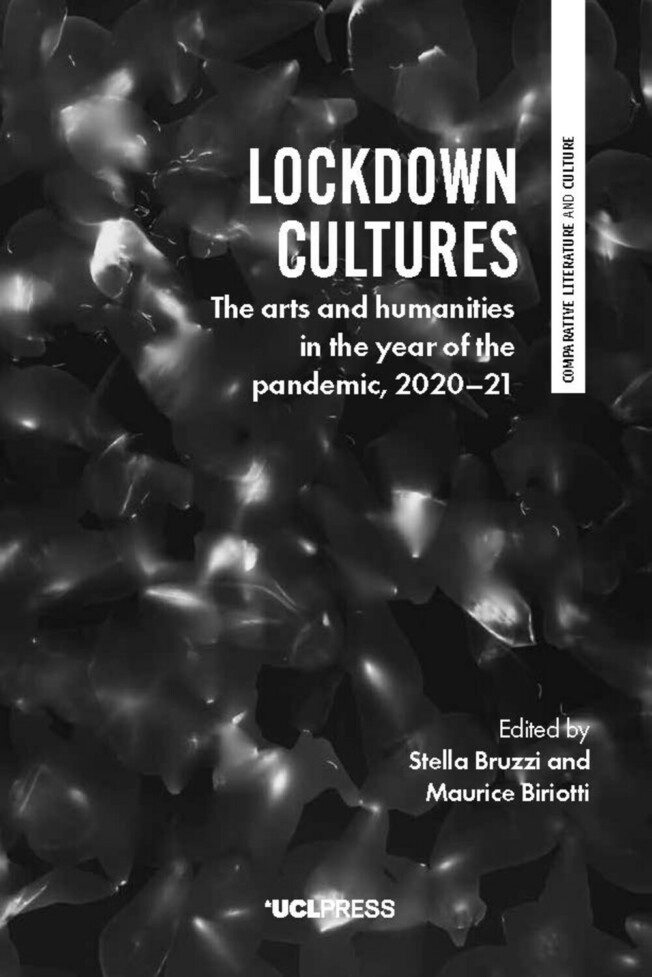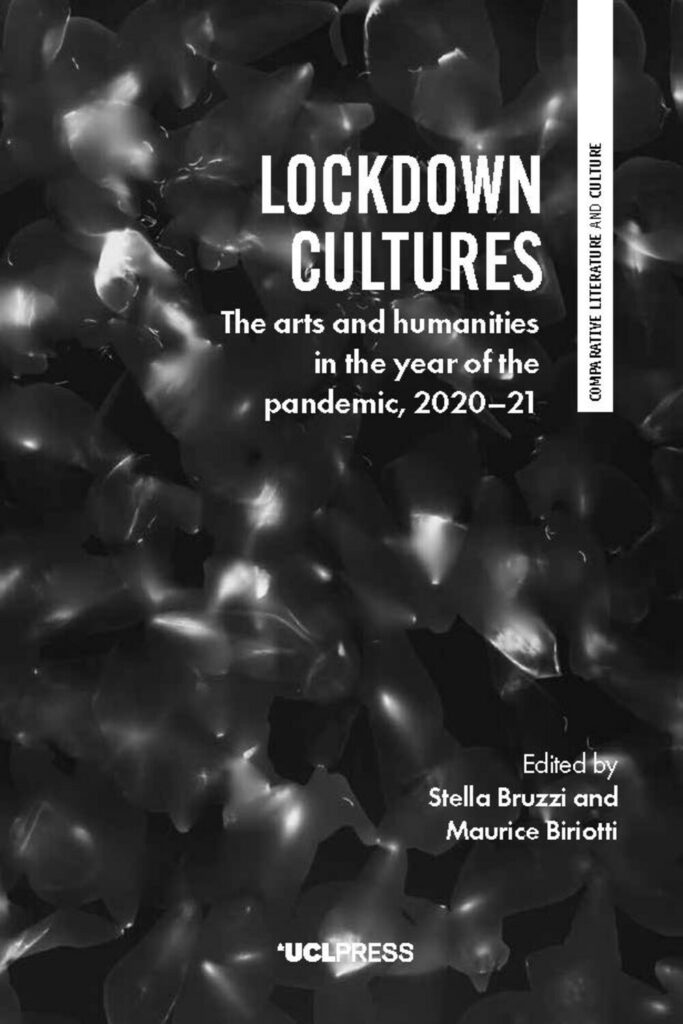
Lockdown Cultures
The arts and humanities in the year of the pandemic, 2020-21
Stella Bruzzi (Editor), Maurice Biriotti (Editor), Sam Caleb (Author), Harvey Wiltshire (Author)
Lockdown Cultures is both a cultural response to our extraordinary times and a manifesto for the arts and humanities and their role in our post-pandemic society.
This book offers a unique response to the question of how the humanities commented on and were impacted by one of the dominant crises of our times: the Covid-19 pandemic. While the role of engineers, epidemiologists and, of course, medics is assumed, Lockdown Cultures illustrates some of the ways in which the humanities understood and analysed 2020–21, the year of lockdown and plague. Though the impulse behind the book was topical, underpinning the richly varied and individual essays is a lasting concern with the value of the humanities in the twenty-first century. Each contributor approaches this differently but there are two dominant strands: how art and culture can help us understand the Covid crisis; and how the value of the humanities can be demonstrated by engaging with cultural products from the past.
The result is a book that serves as testament to the humanities’ reinvigorated and reforged sense of identity, from the perspective of UCL and one of the leading arts and humanities faculties in the world. It bears witness to a globally impactful event while showcasing interdisciplinary thinking and examining how the pandemic has changed how we read, watch, write and educate. More than thirty individual contributions collectively reassert the importance of the arts and humanities for contemporary society.
List of figures
List of contributors
Foreword
Acknowledgements
Introduction
Maurice Biriotti
Part I: Politics
1 ‘Give me liberty or death’
Lee Grieveson
2 Translating Covid-19 information into Yiddish for the Montreal-area Hasidic community
Lily Kahn, Zoë Belk, Kriszta Eszter Szendrői, and Sonya Yampolskaya
3 Shakespeare and the plague of productivity
Harvey Wiltshire
4 The decolonial option and the end of the world
Izabella Wodzka
5 Distant together: creative community in UK DIY music during Covid-19
Kirsty Fife
6 Now are we cyborgs? Affinities and technology in the Covid-19 lockdowns
Emily Baker and Annie Ring
Part II: History
7 Reflections on Covid-like pathogens in ancient Mesopotamia
Markham J. Geller
8 Handwashing save slives: producing and accepting new knowledge in Jens Bjørneboe’s Semmelweis (1968)
Elettra Carbone
9 Experience and coping with isolation: what we can see from ethnic Germans in Britain 1914–18
Mathis J. Gronau
10 Unexpectedly withdrawn and still engaged: reflections on the experiences of the Roman writer and politician Marcus Tullius Cicero
Gesine Manuwald
11 The Gallic Sack of Rome: an exemplum for our times
Elizabeth McKnight
12 On Spinalonga
Panayiota Christodoulidou
Part III: Performance, identity and the screen
13 The thing itself
Alexander Samson
14 Towards a new history: The corona-seminar and the drag king virus
Helena Fallstrom
15 ‘In spite of the tennis’: Beckett’s sporting apocalypse’
Sam Caleb
16 Screening dislocated despair: projecting the neoliberal left-behinds in 100 Flowers Hidden Deep
Nashuyuan Serenity Wang
17 A digital film for digital times: some lockdown thoughts on Gravity
Stephen M. Hart
18 The Great Plague: London’s Dreaded Visitation, 1665
Justin Hardy
Part IV: Literature and writing
19 Lessons for lockdown from Thomas Mann’s The Magic Mountain
Jennifer Rushworth
20 The locked room: On reading crime fiction during the Covid-19 pandemic
Jakob Stougaard-Nielsen
21 The weight of the shrinking world
Florian Mussgnug
22 A voice-mail lyric for a discipline in crisis: On Ben Lerner’s ‘The Media’
Matthew James Holman
23 20,000 leagues under confinement
Patrick Bray
24 Reflections on Guixiu literary cultures in East Asia
Tzu-Yu Lin
Part V: Personal reflections
25 At home: Vaughan Williams’ ‘The Water Mill; and new meaning of ‘quotidian’
Annika Lindskog
26 The habit of freedom
Naomi Siderfin
27 Pandemic dreaming
Adelais Mills
28 In pursuit of blandness: On re-reading Jullien’s In Praise of Blandness during lockdown
Emily Furnell
29 Blinded lights: going viral during the Covid-19 pandemic
Sarah Moore
Part VI: Visual responses
30 Morphologies of agents of the pandemic
SMRU (The Social Morphologies Research Unit : Davdi Burrows,Martin Holbraad, John Cussans, Kelly Fagan Robinson, Melanie Jackson, Dean Kenning, Inigo Minns, Lucy Sames, Hermione Spriggs, Mary Yacoob)
31 Wildfire
John Thomson and Alison Craighead
32 Poems from Gospel Oak
Sharon Morris
33 I have a studio (visit) therefore I exist
Carey Young, Alice Channer, Anne Hardy and Karin Ruggaber
34 Inventory
Jayne Parker
35 After a long time or a short time
Elisabeth S. Clark
36 When the roof blew off
Joe Cain
Index
DOI: 10.14324/111.9781800083394
Number of illustrations: 49
Publication date: 10 November 2022
PDF ISBN: 9781800083394
EPUB ISBN: 9781800083400
Hardback ISBN: 9781800083424
Paperback ISBN: 9781800083431
Stella Bruzzi (Editor)
Maurice Biriotti (Editor)
Sam Caleb (Author)
Sam Caleb is a London Arts and Humanities Partnership-funded PhD candidate in English Literature at UCL
Harvey Wiltshire (Author)
Harvey Wiltshire is a Teaching Fellow in Early Modern Literature, Shakespeare, and Inclusive Pedagogies in the Department of English at Royal Holloway (University of London), having completed his PhD at UCL, where he also taught in the Department of English and the School of European Languages, Culture and Society.
Related titles
Comparative Perspectives on the Rise of the Brazilian Novel
Ana Cláudia Suriani da Silva, Sandra Guardini Vasconcelos,
14 May 2020
Mediating Vulnerability
Anneleen Masschelein, Florian Mussgnug, Jennifer Rushworth,
25 November 2021
Family Life in the Time of COVID
Katherine Twamley, Humera Iqbal, Charlotte Faircloth,
31 August 2023
Lockdown Cultures
The arts and humanities in the year of the pandemic, 2020-21
Lockdown Cultures is both a cultural response to our extraordinary times and a manifesto for the arts and humanities and their role in our post-pandemic society.
This book offers a unique response to the question of how the humanities commented on and were impacted by one of the dominant crises of our times: the Covid-19 pandemic. While the role of engineers, epidemiologists and, of course, medics is assumed, Lockdown Cultures illustrates some of the ways in which the humanities understood and analysed 2020–21, the year of lockdown and plague. Though the impulse behind the book was topical, underpinning the richly varied and individual essays is a lasting concern with the value of the humanities in the twenty-first century. Each contributor approaches this differently but there are two dominant strands: how art and culture can help us understand the Covid crisis; and how the value of the humanities can be demonstrated by engaging with cultural products from the past.
The result is a book that serves as testament to the humanities’ reinvigorated and reforged sense of identity, from the perspective of UCL and one of the leading arts and humanities faculties in the world. It bears witness to a globally impactful event while showcasing interdisciplinary thinking and examining how the pandemic has changed how we read, watch, write and educate. More than thirty individual contributions collectively reassert the importance of the arts and humanities for contemporary society.

